Unity Against Racism
Unity Against Racism
We know that our ethnically diverse community experience inequalities in access, experience, and outcomes in health services compared to white groups.
- See facts about health inequalities in the UK
- Read our action statement, including our Improvement Activity Plans
- Read our five key areas
- Meet our anti-racism taskforce
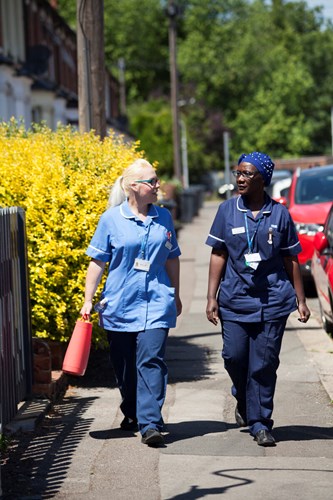
Some facts about health inequalities in the UK
- South Asian people have a 40% higher death rate from coronary heart disease than the general population
- Black women are 4 times more likely to die in pregnancy or childbirth
- South Asian and Black people are 2-4 times more likely to develop Type 2 diabetes than white people
- African-Caribbean men are more likely to develop prostate cancer than white men of the same age
Locally, we know that:
- In some of our services, there are unexplained disparities in wait times by ethnicity
- There are some unexplained disparities in usage of some services
- Black males are more likely to be detained under the Mental Health Act
- There are some unexplained disparities in the numbers of people that do not attend appointments by ethnicity
We know that there are unacceptable disparities in experience for our ethnically diverse colleagues
- Ethnically diverse colleagues are 10.6% more likely to experience harassment, bullying or abuse from members of the public
- White colleagues are up to 1.93 times more likely to progress their career
- Ethnically diverse colleagues are 4.2% more likely to experience harassment, bullying, or abuse from colleagues
- 81% of incidents reported with a discrimination element relate to race
See our Workforce Race Equality Standard (WRES) 2024 report (pdf)
Read our Ethnicity Pay Gap reports
This needs to change, so we’ve made a commitment to becoming an anti-racist organisation.
‘Not being racist’ is not enough – we need to actively work together to address all types and impacts of racism.
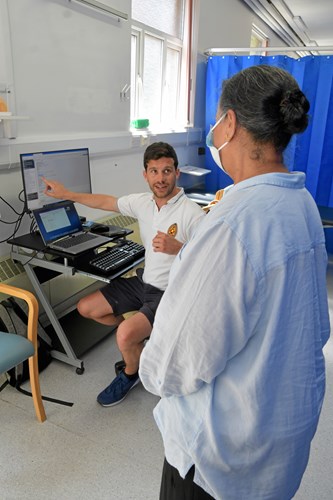

Our action statement
Berkshire Healthcare is committed to becoming an anti-racist organisation, in a purposeful and impactful way, as part of our corporate strategy.We take an active role in identifying and addressing all types and impacts of racism, not just when it is obvious.
The Board holds the responsibility for leading our anti-racism efforts and ensuring measurable objectives are achieved.
We firmly believe that anti-racism activity should not be solely placed on racialised groups. Instead, we embrace actively involving our Race Equality Network, colleagues, and communities to make meaningful change.
Our approach to achieving this includes:
- Making changes and taking positive actions that promote racial equity in all parts of our organisation
- Allocating resources to support our anti-racism agenda and monitor progress
- Supporting and encouraging our colleagues and community to actively participate in anti-racist practices
- Regularly and openly communicating our commitments and progress
Read our EDI Improvement Activity paper - November 2023 (pdf)
1. Patient access, experiences, and outcomes
What are the issues?
There are unacceptable disparities across access, experience and outcomes nationally and locally. We have committed to tackling health inequalities as part of our corporate strategy.
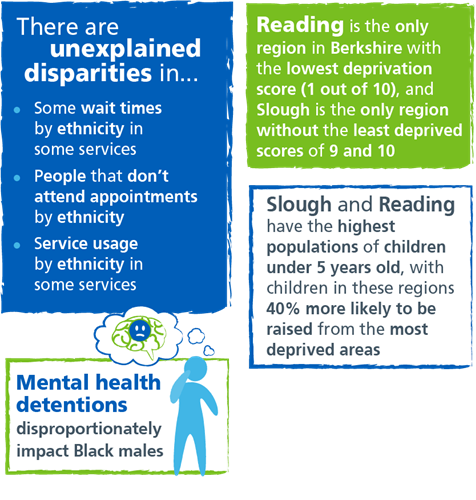
National data shows disparities across vast areas of avoidable health inequality:
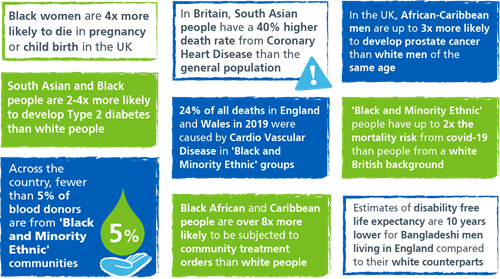
How we're responding
- Developing our Health Inequality Strategy (view the pdf)
- Invested in a project on disproportionate Mental Health Act detentions of Black communities partnering with MIND to deliver change and engage with our community
- We launched our CommUNITY Anti-Racism Forum in Healthcare, which celebrated its first anniversary in November 2024. As part of signing up to this forum, our communities shared their priorities with us.
Find out more about our CommUNITY Forum and sign up to join
- We refreshed our approach to Equality Impact Assessments
- We’re building an approach to better tackle inequality and provide health promotion and opportunistic episodes of care for Gypsy, Traveller, Roma, Showmen and Boater communities that have a high rate of underserved children, health inequalities and unmet mental health needs in health visiting service
- We’re using Quality Improvement (QI) approaches to address local disparities
2. Anti-racism education and engagement
What are the issues?
Our colleagues who attended anti-racism workshops told us they want us to focus on education and training. Members of the community have asked for more outreach and structured engagement.
They also wanted more anti-racist literature to be made available to staff, for services to be culturally tailored, and for staff to have a better understanding of language barriers and know what support is available for asylum seekers.
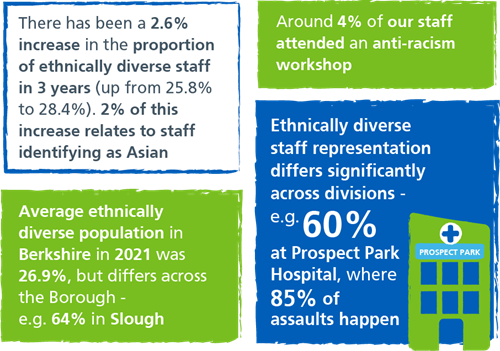
How we're responding
- Our Anti-Racism taskforce meets monthly to review progress and any learning and insights from our actions, and issues arising
- Our Deputy CEO produced a white allyship video, and each of our Executive team gives regular updates on their workstream on our all- staff briefings
- Our Induction training for new starters covers allyship, microaggressions, being an upstander, equality impact assessments and developing an impact centred approach to conflict
- Celebrating events linked to key equality dates – such as Windrush, South Asian Heritage Month and Black History Month
- Our Executive team visited our key sites to talk to staff about our actions plans, concerns and thoughts
- We’ve introduced anti-racism in to coaching and our leadership development programme
3. Incidents, support, and empowerment
What are the issues?
Staff who attended our workshops called for early resolution and transparency when racist incidents happen to help improve the experience for people.
Our communities wanted us to ensure we learn from mistakes.
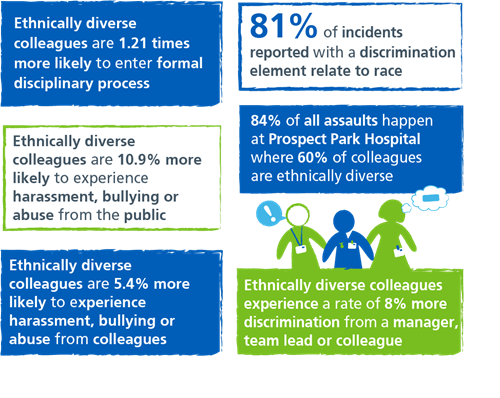
How we're responding
- We’ve made zero tolerance of racism a condition of admission for patients at Prospect Park Hospital
- We launched the Prospect Park Hospital Advocacy for Racial Equity Team (PPARET) to assist staff with racial abuse and train advocates to frequently visit wards
- Our Violence Prevention and Reduction (VPR) Working Group meets monthly to review progress and insights to ensure swift action is taken
- We reviewed and re-publicised our Abuse statement which is now on patient letter templates and on signage across our Trust
- We’ve included anti-racism in our appraisal conversations for all staff
- We delivered anti-racism training for our HR colleagues and investigating officers
- We developed anonymous feedback tool and publicise the answers on our intranet page to help education and understanding
What we have done so far
- We analysed our ethnicity pay gap and triangulated with gender.
- We reviewed our training data by ethnicity to ensure colleagues are receiving equitable access to training and personal development
- We’ve developed leadership and management training incorporating cultural intelligence and conscious inclusion and to explicitly include and support antiracist behaviour
4. Recruitment, retention, progression, and conditions
What are the issues?
Despite numerous publications, recommendations, and legal cases, ongoing inequalities still exist in relation to ethnically diverse colleagues in terms of recruitment, retention, career advancement, and working conditions.
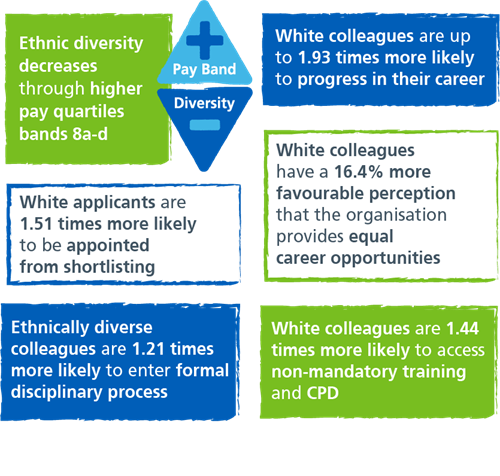
How we're responding
- We’ve reviewed our access to CPD data and the process to which funds are allocated is managed through a diverse panel
- Developed our Leadership and Talent Strategy, which has seen us introduce talent and career conversations for all staff in their mid-year appraisal
- Continued our ethnicity pay gap reporting and introduced intersectionality looking at gender and ethnicity
- We introduced a guaranteed interview for ethnically diverse colleagues who meet the essential criteria at Band 8b+ job roles
- We are de-biasing job descriptions by removing desirable criteria and reviewing language
- We Introduced a reflective checklist at roles banded 8b+ to improve representation and diversity in senior roles
5. Anti-racism policy and practice
What are the issues?
We know that the way some of our policies and practice are structured disadvantages ethnically diverse people and we need to do more to effectively challenge this.
How we're responding
- We are developing a positive practice tool to identify and address areas of improvement in antiracism at local service level
- We have reviewed our photo bank to ensure it is culturally appropriate
- We asked all our teams to have an antiracism objective on their annual team Plan On A Page
- We’re providing anti-racism training to policy scrutiny groups to equip policy makers to consider antiracism implications when scrutinising polices
- We’re developing health inequalities and antiracism data analytical training to support colleagues in analysing data to address inequalities
Our taskforce
A dedicated team responsible for driving positive change and fostering an inclusive, equitable and antiracist organisational culture.
Our aims
- Develop an anti-racism strategy
- Establish a system for tracking and reporting on progress on anti-racism initiatives
- Advocate for resources and support needed to execute the anti-racism strategy effectively
- Assess policies and procedures to identify potential biases and discriminatory practices
- Raise awareness about racism, privilege and unconscious bias
- Create mechanisms for colleagues to express concerns, share experiences and provide feedback
Each of our members have provided a short statement about how they will put our strategy into practice.
Meet our anti-racism taskforce
Race Equality Matters (REM)
We’re proud to have been awarded the Race Equality Matters (REM) Silver Trailblazer Status. This award recognises our ongoing commitment to being an anti-racist organisation. Rather than starting at the bronze level, we have been awarded Silver status, which is valid for two years and is currently the highest available award.
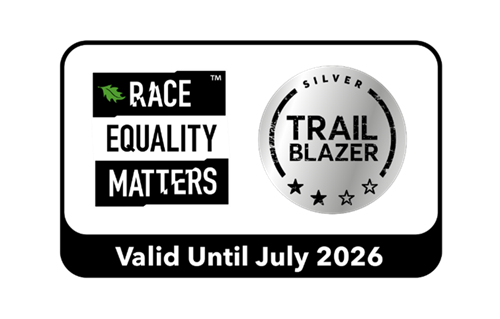
The application process involved evidencing initiatives, strategies and engagement with senior leaders and our ethnically diverse colleagues.
This award highlights our collaboration with our Race Equality Network and our work on educational development, improved reporting, creation of the anti-racism taskforce and our leadership led workstreams.
Our Trailblazer case study
Read our Trailblazer case study on the REM website (new browser tab)
This recognition was awarded by an independent panel of experts, all of whom have firsthand experience with race inequality in the workplace.
Their endorsement confirms that our efforts are making a meaningful impact throughout the organisation.
Race Equality Matters is a not-for-profit organisation dedicated to transforming talk into action.
Formed in response to the 2020 Black Lives Matter movement, REM emphasises the urgent need to address race inequality now. They collaborate with individuals who have lived experiences of race inequality to develop practical tools and solutions.
Through the extensive REM network, these co-created solutions are reaching countless organisations and millions of employees. This collective effort is paving the way for the change we all aspire to see and experience.